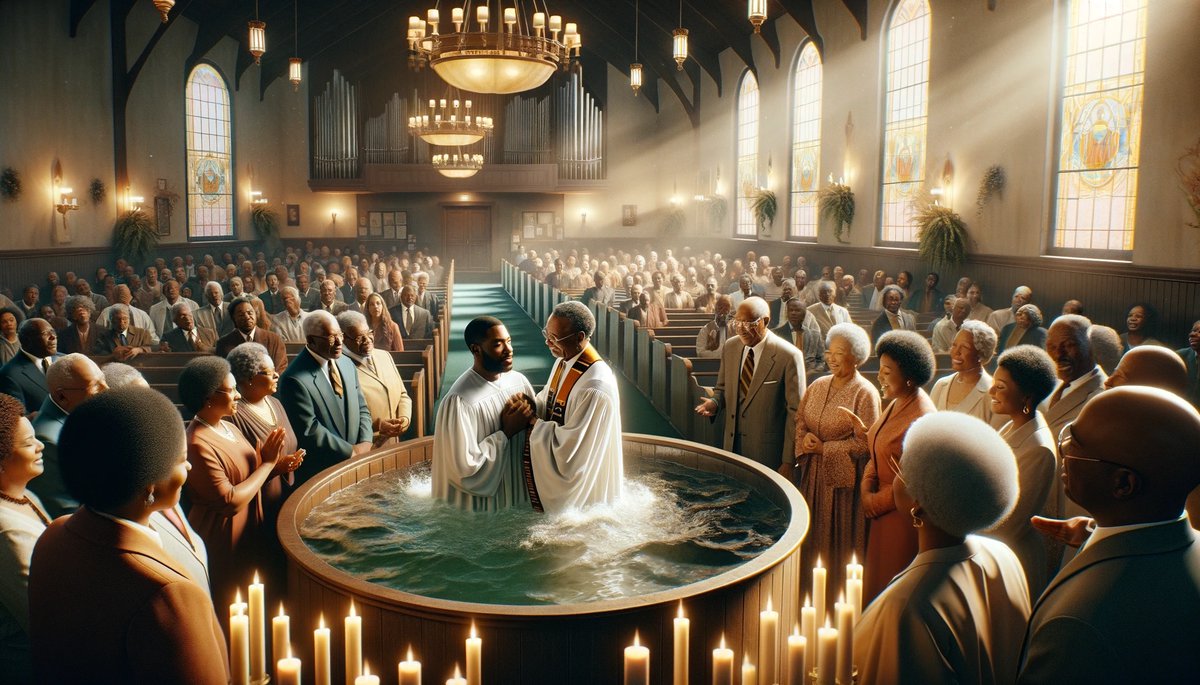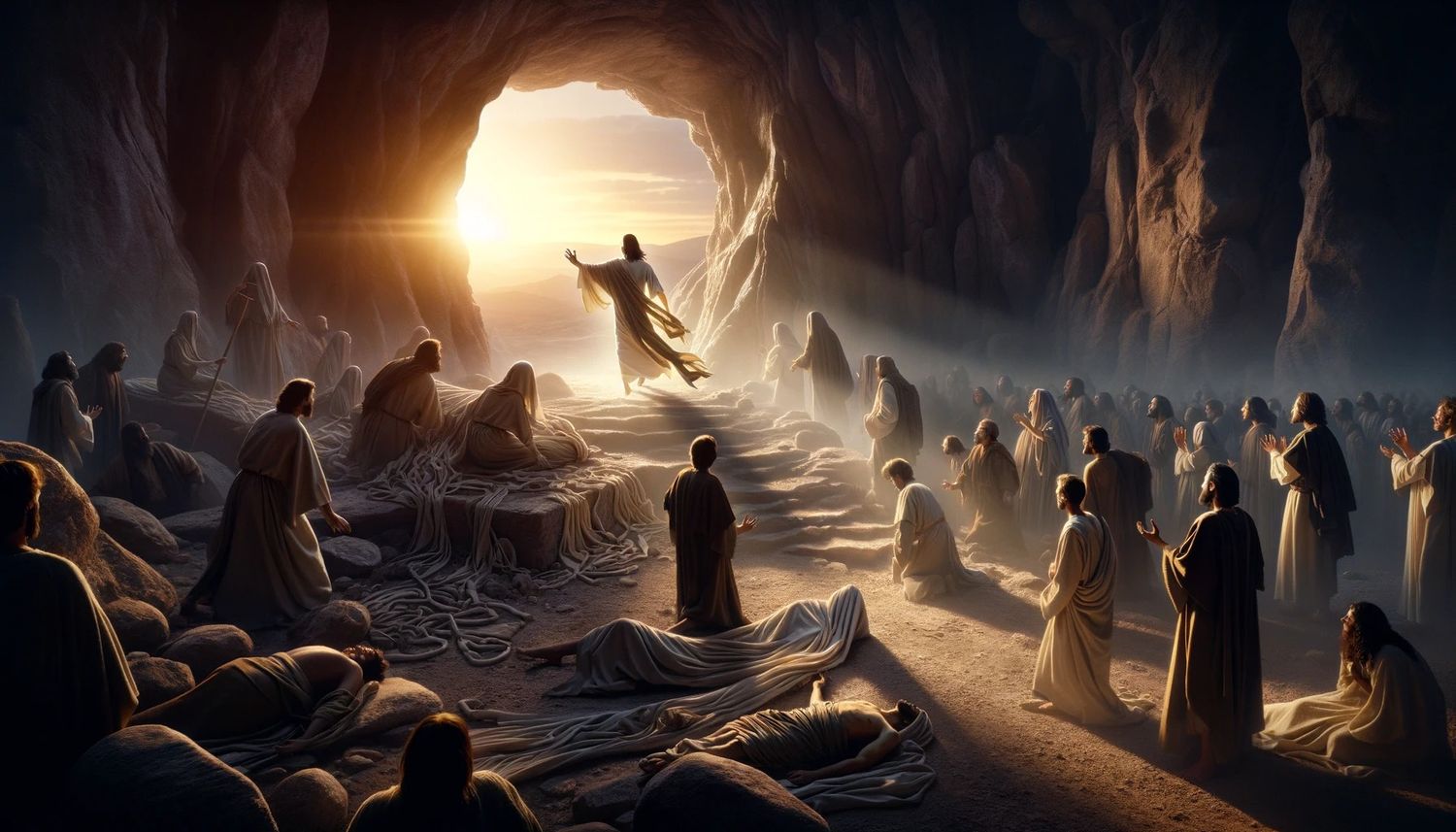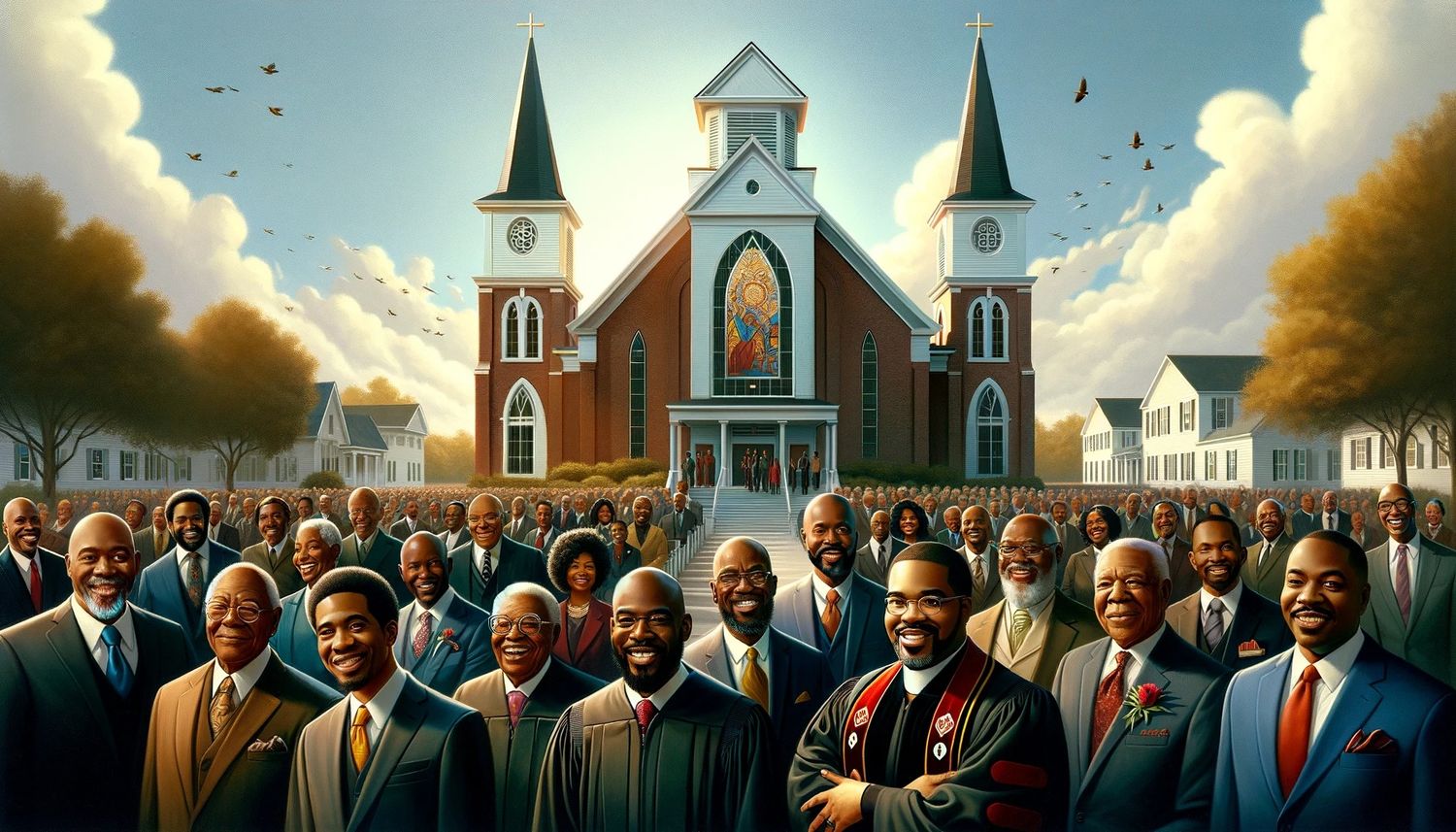Home>Theology and Spirituality>How Many People Are Baptist In The Us


Theology and Spirituality
How Many People Are Baptist In The Us
Published: February 21, 2024
Ericka Andersen, an editor at Christian.net, expertly merges digital strategy with content creation, focusing on faith and societal issues. Her communication skills enhance the platform's engaging narratives, fostering meaningful dialogue on belief's impact on society.
Discover the latest statistics on the number of Baptist followers in the US and explore the impact of Baptist theology and spirituality on American society. Gain insights into the growth and influence of this religious community.
(Many of the links in this article redirect to a specific reviewed product. Your purchase of these products through affiliate links helps to generate commission for Christian.net, at no extra cost. Learn more)
Table of Contents
Introduction
The Baptist faith has played a significant role in shaping the religious landscape of the United States. With a rich history dating back to the early colonial period, Baptists have established themselves as a prominent religious denomination in the country. Their beliefs, practices, and influence on American society have left an indelible mark on the nation's cultural and spiritual fabric.
From the fervent revivals of the 18th century to the present day, the Baptist community has been characterized by its emphasis on personal faith, congregational autonomy, and the practice of believer's baptism. As a result, Baptist churches have flourished across the United States, attracting a diverse array of followers who are drawn to the denomination's emphasis on individual spiritual experience and community engagement.
In this article, we will delve into the history of Baptist in the US, exploring the origins of the faith and its evolution over the centuries. We will also examine the demographics of the Baptist community, shedding light on the number of adherents and their distribution across the country. Furthermore, we will explore the core beliefs and practices that define the Baptist tradition, offering insights into the theological underpinnings that have shaped the faith.
Additionally, we will consider the influence of Baptist churches on American society, from their involvement in social justice movements to their contributions to the cultural and political landscape. By examining these aspects, we aim to provide a comprehensive understanding of the Baptist faith and its impact on the United States.
As we embark on this exploration, it becomes evident that the Baptist tradition is not only a religious denomination but also a dynamic force that has left an enduring imprint on the spiritual, social, and cultural tapestry of the United States. Through this journey, we will gain a deeper appreciation for the role of Baptist in shaping the nation's identity and ethos.
Read more: How Many People In The World Are Baptist
History of Baptist in the US
The history of Baptists in the United States is deeply intertwined with the country's colonial and post-colonial eras. The roots of the Baptist tradition in America can be traced back to the early 17th century when English Separatists and Puritans sought religious freedom in the New World. These early settlers brought with them diverse theological perspectives, laying the groundwork for the development of various Christian denominations, including the Baptist faith.
One of the defining moments in the history of Baptists in America occurred in 1639 when a group of settlers in Providence, Rhode Island, led by Roger Williams, established the first Baptist church on American soil. This marked the beginning of organized Baptist congregations in the New World, setting the stage for the denomination's growth and influence in the centuries to come.
Throughout the colonial period, Baptists faced persecution and discrimination, often clashing with the religious and political authorities of the time. Despite these challenges, the Baptist movement continued to gain momentum, attracting followers who were drawn to its emphasis on individual conscience, the priesthood of all believers, and the autonomy of local congregations.
The Great Awakening of the 18th century further propelled the spread of Baptist beliefs across the American colonies. The revivalist fervor of this period, characterized by passionate preaching and fervent conversions, provided fertile ground for the expansion of Baptist churches. Influential figures such as George Whitefield and Jonathan Edwards played pivotal roles in igniting spiritual fervor and attracting converts to the Baptist faith.
As the United States gained independence and entered the 19th century, Baptists experienced significant growth and diversification. The denomination expanded westward, establishing churches in new territories and contributing to the religious pluralism that defined the young nation. The 19th century also witnessed the emergence of distinct Baptist groups, including the Southern Baptist Convention and the American Baptist Churches USA, each with its own theological emphases and regional affiliations.
The history of Baptists in the United States is marked by a legacy of resilience, diversity, and adaptability. From their humble beginnings in the colonial era to their present-day presence across the country, Baptists have contributed to the religious tapestry of America, leaving an indelible mark on its spiritual heritage.
Demographics of Baptist in the US
The Baptist community in the United States represents a significant segment of the country's religious landscape, with a diverse and widespread presence. As of the most recent data, it is estimated that there are approximately 33 million Baptists in the US, encompassing a wide spectrum of theological perspectives, worship styles, and cultural backgrounds. This sizable population underscores the enduring influence of the Baptist tradition and its enduring appeal to a broad cross-section of American society.
Baptists are dispersed across the nation, with a notable concentration in the Southern and Southwestern regions, where the denomination has historically held a strong presence. However, Baptist churches can be found in virtually every state, reflecting the widespread impact of the faith on local communities and the broader American populace. This geographical diversity underscores the adaptability and resilience of the Baptist tradition, as it has thrived in a multitude of cultural and regional contexts.
Furthermore, the demographics of Baptist adherents in the US encompass a wide range of age groups, ethnicities, and socio-economic backgrounds. While the denomination has deep historical roots in certain demographic segments, there has been a concerted effort to embrace diversity and inclusivity, leading to a more heterogeneous Baptist community. This inclusivity has been instrumental in ensuring the relevance and vitality of Baptist churches in an ever-changing society, as they seek to engage with a broad spectrum of individuals and families.
Moreover, the Baptist tradition has a significant presence among African American communities, with a rich heritage that dates back to the era of slavery and the subsequent struggle for civil rights. African American Baptist congregations have played a pivotal role in shaping the spiritual and social dynamics of their communities, contributing to the vibrant tapestry of American religious expression.
In addition to its domestic influence, the Baptist community in the US has also made substantial contributions to global missions and humanitarian efforts, reflecting a commitment to spreading the gospel and addressing social needs both at home and abroad. This outward focus has further solidified the Baptist tradition's impact on the broader global community, positioning it as a dynamic and engaged participant in the global religious landscape.
The demographics of Baptist in the US underscore the denomination's enduring relevance and adaptability, as it continues to attract a diverse array of followers and maintain a robust presence in American society. This multifaceted demographic profile reflects the Baptist tradition's ability to resonate with individuals from various backgrounds and walks of life, ensuring its continued significance in the religious mosaic of the United States.
Baptist beliefs and practices
The Baptist tradition is characterized by a distinctive set of beliefs and practices that have shaped its identity and theological outlook. Central to Baptist theology is the principle of soul freedom, which emphasizes the autonomy of the individual in matters of faith and conscience. This foundational belief underscores the Baptist commitment to the priesthood of all believers, affirming the right of each person to interpret scripture and discern their spiritual path without coercion or external authority.
Believer's baptism, a core tenet of Baptist faith, symbolizes the individual's personal commitment to Christ and the community of believers. Unlike infant baptism practiced in some Christian traditions, Baptists uphold the practice of baptizing only those who have made a conscious decision to follow Christ, viewing baptism as a public declaration of faith and a symbolic act of spiritual rebirth.
Furthermore, Baptists adhere to the authority of scripture as the primary source of divine revelation and guidance for faith and practice. The Bible is revered as the inspired and authoritative Word of God, serving as the cornerstone of doctrinal beliefs and ethical principles within Baptist communities. This commitment to scriptural authority underscores the Baptist tradition's emphasis on biblical literacy, expository preaching, and the application of biblical teachings to everyday life.
In worship and congregational life, Baptist churches exhibit a diversity of practices, reflecting a range of theological and cultural influences. While some congregations embrace traditional hymnody and liturgical elements, others incorporate contemporary music and informal worship styles. This flexibility in worship reflects the Baptist commitment to congregational autonomy, allowing each church to shape its worship practices according to its unique context and preferences.
The democratic governance of Baptist churches is another hallmark of the tradition, with congregational polity serving as the organizational structure. This model affirms the authority of the local church in decision-making processes, including the selection of leaders, the affirmation of doctrinal statements, and the administration of church affairs. As a result, Baptist congregations operate with a high degree of independence and self-governance, fostering a sense of ownership and responsibility among members.
Additionally, the Baptist tradition upholds the priesthood of all believers, affirming the equal spiritual standing of every believer before God. This egalitarian principle encourages active participation in the life of the church, empowering individuals to exercise their spiritual gifts and contribute to the community's ministry and mission.
In summary, the beliefs and practices of the Baptist tradition reflect a commitment to individual autonomy, scriptural authority, diverse worship expressions, congregational autonomy, and the priesthood of all believers. These foundational principles have shaped the identity and ethos of Baptist churches, fostering a dynamic and diverse religious community that continues to resonate with individuals seeking a faith characterized by personal conviction, community engagement, and scriptural fidelity.
Influence of Baptist in the US society
The influence of the Baptist tradition on American society extends far beyond the realm of religious practice, permeating various facets of the nation's cultural, social, and political landscape. From its historical involvement in movements for religious liberty and abolition to its contemporary impact on civil rights and community outreach, Baptist churches have left an indelible mark on the ethos of the United States.
One of the most significant contributions of Baptist churches to American society is their historical advocacy for religious freedom and separation of church and state. Dating back to the colonial era, Baptists were vocal proponents of religious liberty, challenging the established religious hierarchies and advocating for the freedom of conscience for all individuals. Their steadfast commitment to religious freedom has had a lasting impact on the legal and philosophical foundations of the United States, influencing the inclusion of religious liberty protections in the Bill of Rights and shaping the nation's commitment to pluralism and diversity.
Furthermore, Baptist churches have played a pivotal role in social justice movements, particularly in the fight against slavery and the quest for civil rights. Throughout American history, Baptist leaders and congregations have been at the forefront of movements for racial equality, advocating for the dignity and rights of all individuals regardless of race or ethnicity. Figures such as Martin Luther King Jr., a Baptist minister, exemplified the tradition's commitment to justice and equality, leading transformative efforts to dismantle racial segregation and advance the cause of civil rights for African Americans.
In addition to their advocacy for social justice, Baptist churches have been instrumental in addressing community needs and providing humanitarian assistance. Through initiatives such as food banks, homeless shelters, and disaster relief efforts, Baptist congregations have demonstrated a commitment to serving the marginalized and vulnerable members of society, embodying the principles of compassion and solidarity.
Moreover, the influence of Baptist churches is evident in the realm of public discourse and civic engagement. As centers of community life, Baptist congregations have served as platforms for dialogue, education, and advocacy on issues of public concern, ranging from healthcare and education to environmental stewardship and immigration reform. Their engagement in public affairs reflects a commitment to promoting the common good and fostering a sense of social responsibility among their members.
Overall, the influence of Baptist churches on American society is multifaceted and enduring, encompassing a legacy of advocacy for religious freedom, social justice, community service, and civic engagement. As vibrant and dynamic institutions, Baptist churches continue to shape the moral and ethical fabric of the United States, embodying a tradition that is deeply rooted in the pursuit of justice, compassion, and the common good.
Read more: How Many People Believe In Jesus Christ
Conclusion
The Baptist tradition has woven itself intricately into the fabric of American religious, social, and cultural life, leaving an enduring legacy that spans centuries. From its humble beginnings in the colonial era to its present-day presence across the diverse landscape of the United States, Baptist churches have embodied a commitment to individual autonomy, scriptural fidelity, and social engagement. The history of Baptists in the US reflects a narrative of resilience, diversity, and adaptability, as the tradition has navigated through periods of persecution, revival, and expansion, shaping its identity and influence along the way.
The demographics of Baptist adherents in the US underscore the denomination's enduring relevance and adaptability, as it continues to attract a diverse array of followers and maintain a robust presence in American society. The multifaceted demographic profile reflects the Baptist tradition's ability to resonate with individuals from various backgrounds and walks of life, ensuring its continued significance in the religious mosaic of the United States.
Furthermore, the beliefs and practices of the Baptist tradition reflect a commitment to individual autonomy, scriptural authority, diverse worship expressions, congregational autonomy, and the priesthood of all believers. These foundational principles have shaped the identity and ethos of Baptist churches, fostering a dynamic and diverse religious community that continues to resonate with individuals seeking a faith characterized by personal conviction, community engagement, and scriptural fidelity.
The influence of Baptist churches on American society extends far beyond the realm of religious practice, permeating various facets of the nation's cultural, social, and political landscape. From its historical advocacy for religious liberty and separation of church and state to its contemporary impact on civil rights and community outreach, Baptist churches have left an indelible mark on the ethos of the United States. Their commitment to justice, compassion, and the common good has positioned Baptist churches as dynamic agents of positive change within American society.
In conclusion, the Baptist tradition stands as a testament to the enduring power of faith, community, and social responsibility. Its impact on the United States is a testament to the resilience and adaptability of the tradition, as it continues to inspire individuals, shape communities, and contribute to the broader tapestry of American life. As the Baptist community looks to the future, its rich heritage and unwavering commitment to its core principles ensure that its influence will continue to resonate across the diverse landscape of the United States, embodying a tradition that is deeply rooted in the pursuit of justice, compassion, and the common good.














